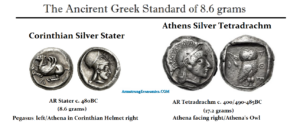Are you interested in uncovering ancient mysteries and connecting them with economic principles? At Extreme Investor Network, we delve into the fascinating world of ancient civilizations and how their knowledge may have influenced modern economic systems.
One intriguing mystery we explore is the alignment of the Greek denomination of the stater with the 8.6 frequency of the Economic Confidence Model. The silver stater minted at Corinth and the Athenian silver didrachm were both at the precise weight of 8.6 grams. This raises questions about why this specific weight was chosen and hints at a possible connection to Pi, the mathematical constant that has fascinated scholars for centuries.
Looking back at ancient Babylonian and Egyptian civilizations, we discover their advanced mathematical knowledge, including the calculation of Pi. The Egyptians’ precise approximation of Pi on the Rhind Papyrus showcases their remarkable understanding of mathematics, hinting at a level of sophistication in ancient societies that still captivates us today.
Furthermore, our exploration extends to theories of advanced civilizations that may have existed during the last Ice Age, as proposed by researchers like Graham Hancock. The concept of cyclical climate changes, recorded over millennia, adds another layer to our understanding of prehistoric civilizations and their potential impact on economic development.
We also investigate the collapse of Bronze Age civilizations and the role of climatic shifts in triggering widespread famine and migration. The Sea Peoples and their influence on ancient societies are scrutinized, alongside the concept of fractal cycles that may have influenced historical events.
Join us at Extreme Investor Network as we uncover the secrets of ancient civilizations, connect them to economic principles, and explore how knowledge from the past can inform our understanding of the present and the future. Explore the intersection of history, economics, and human civilization like never before on our platform.

